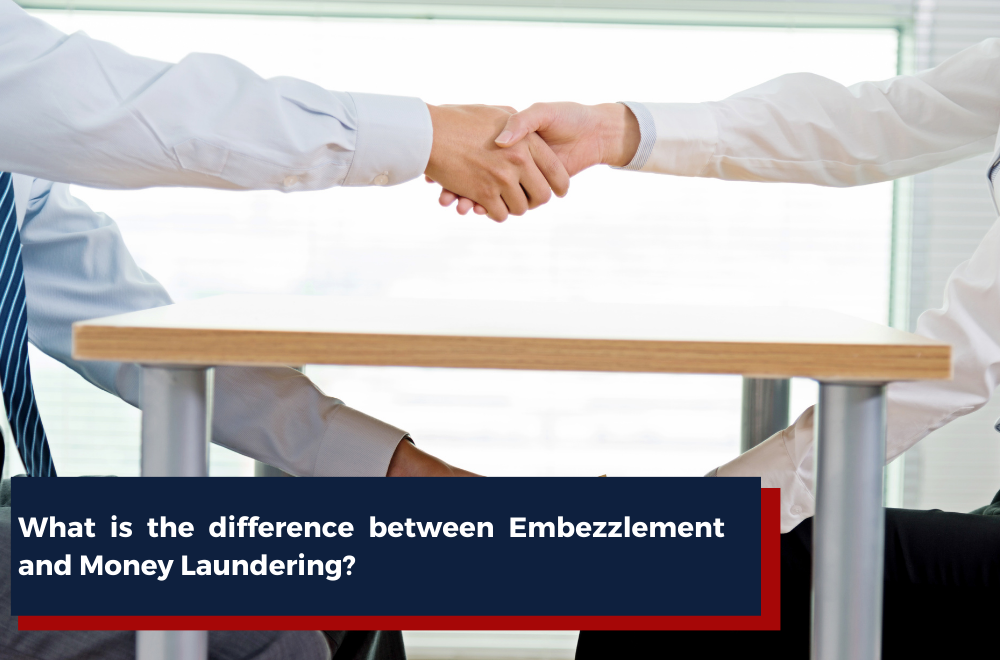
Have you been accused of embezzlement or money laundering? These are two of the most serious white-collar offenses. Accordingly, they also carry some of the stiffest penalties, including hefty fines and significant prison time. Embezzlement involves the intentional misappropriation of funds. By contrast, money laundering describes an attempt to make illegally gained proceeds appear to originate from a legal source.
Read on to learn more. Do not hesitate to contact Keith Oliver Criminal Law to schedule your free, confidential consultation today.
What Is Money Laundering?
Money laundering is a form of fraud or deception used to conceal the source of illegally obtained money. Money laundering schemes often involve a complex series of monetary transactions designed to cover tracks. They may take place through various bank accounts and companies. Sometimes these transactions even occur across international borders.
New Jersey law defines money laundering very specifically. An individual is guilty of money laundering if the person:
- Transports or possesses property which a reasonable person would believe to be derived from criminal activity;
- Engages in a transaction involving property which a reasonable person would believe to be derived from criminal activity with the intent to facilitate/promote the criminal activity or knowing that the transaction is designed to conceal/disguise the nature, location, source, ownership or control of the property;
- Engages in a transaction involving property which a reasonable person would believe to be derived from criminal activity with the intent to avoid a reporting requirement under the laws of a state or the federal government; or
- Directs, organizes, finances, plans, manages, supervises, or controls the transportation of or transactions in property which a reasonable person would believe to be derived from criminal activity.
You can be found guilty of money laundering for undertaking any of these acts on your own or by acting in concert with others.
What Is Embezzlement?
“Embezzlement” is a fancy name for theft. New Jersey law defines it as “theft by failure to make required disposition of property received.” Someone commits embezzlement if they are entrusted with property or funds of another and takes it for personal use. This crime typically occurs in white-collar settings when an employee takes funds, goods, or services from their employer, steals money from customers, or otherwise makes use of another’s funds without permission.
The specific language in the governing statute provides as follows:
“A person who purposely obtains or retains property upon agreement or subject to a known legal obligation to make specified payment or other disposition, whether from such property or its proceeds or from his own property to be reserved in equivalent amount, is guilty of theft if he deals with the property obtained as his own and fails to make the required payment or disposition.”
What Are the Criminal Penalties for Money Laundering in New Jersey?
Money laundering is a serious criminal offense in New Jersey. If convicted of money laundering, you may face severe penalties, including jail time and fines. In order of severity, the penalties for money laundering in New Jersey are:
- 3rd Degree – A third-degree money laundering conviction may lead to up to 5 years in jail and a fine of up to $15,000. Third-degree money laundering involves sums of less than $75,000.
- 2nd Degree – A second-degree money laundering conviction may result in 5-10 years in prison and up to $150,000 in fines. Second-degree money laundering involves sums between $75,000-500,000.
- 1st Degree – A first-degree money laundering conviction may result in 10-20 years in prison and fines of up to $200,000. First-degree money laundering involves sums of $500,000 or more.
Importantly, prosecutors can also rely on federal prohibitions against money laundering when bringing their charges. Our legal team is ready to defend your rights in both state-level and federal prosecutions.
What Are the Criminal Penalties for Embezzlement in New Jersey?
Like money laundering offenses, the penalties for embezzlement depend on the value of the property involved. In order of severity, the penalties for this form of theft in New Jersey are:
- Disorderly Persons Offense – Embezzling under $200 is considered a “disorderly persons offense,” the New Jersey equivalent of a misdemeanor in other states. A conviction could result in up to 6 months in jail and up to $1,000 in fines.
- 4th Degree – Embezzling between $200-500 is a 4th degree indictable offense that may result in up to 18 months in jail and up to $10,000 in fines.
- 3rd Degree – Embezzling between $500-75,000 is a 3rd degree indictable offense that may result in 3-5 years in jail and up to $15,000 in fines.
- 2nd Degree – Embezzling $75,000 or more is a 2nd-degree indictable offense that may result in 5-10 years in jail and up to $150,000 in fines.
Possible Defenses for Money Laundering and Embezzlement Charges
It is important that you know your legal rights and understand potential defense strategies when facing criminal charges related to money laundering or embezzlement. Depending on the circumstances of your case, available defenses against money laundering or embezzlement charges in New Jersey may include:
- Insufficient evidence – If there is not enough evidence to prove your guilt beyond a reasonable doubt, your charges may be dropped by prosecutors or dismissed in court.
- Lack of intent – The charge may qualify for a dismissal if it can be shown that you did intend to engage in illegal activity.
- Mistaken identity – Even if funds were misappropriated or their source was illegally obfuscated, you can attempt to prove that you were not involved.
- Duress – If you participated in a crime by force or under threat of violence, your lawyer could also use this as a defense in court.
- Good faith mistake – If you believed you were behaving within the confines of the law at the time of the alleged money laundering or embezzlement, this may also serve as the basis of a defense against criminal charges.
How Can a New Jersey Criminal Defense Attorney Help?
No matter the circumstances, having an experienced attorney fighting in your corner is essential when confronting a money laundering or embezzlement charge in New Jersey. Our skilled criminal defense attorneys can help by:
- Investigating the facts of your case
- Developing a strong defense strategy
- Challenging unlawfully obtained evidence
- Negotiating with prosecutors to reduce or dismiss charges
- Representing you in court during hearings and trials
- Advocating for lower penalties if you are convicted
- Challenging witness testimony presented by the prosecution
- Filing an appeal if you are convicted
Contact the New Jersey Criminal Defense Lawyers at Keith Oliver Criminal Law for Help
When facing money laundering or embezzlement charges, you need an experienced and aggressive defense team fighting in your corner. Keith Oliver Criminal Law vigorously defends the rights of those accused of white-collar crimes, including embezzlement and money laundering. Our skilled New Jersey criminal defense attorneys understand the complex law governing financial crimes. We are ready to put our knowledge and experience to work on your behalf. Contact Keith Oliver Criminal Law to schedule a free, confidential consultation today.

